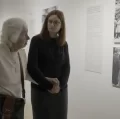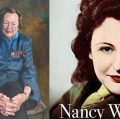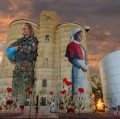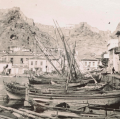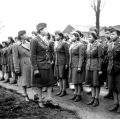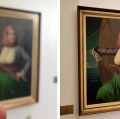Gertrude Margaret Lowthian Bell, CBE (14 July 1868 – 12 July 1926) was an English writer, traveller, political officer, administrator, and archaeologist who explored, mapped, and became highly influential to British imperial policy-making due to her knowledge and contacts, built up through extensive travels in Syria-Palestine, Mesopotamia, Asia Minor, and Arabia. Bell helped support the Hashemite dynasties in what is today Jordan as well as in Iraq. She played a major role in establishing and helping administer the modern state of Iraq, using her unique perspective from her travels and relations with tribal leaders throughout the Middle East. During her lifetime she was highly esteemed and trusted by British officials and exerted an immense amount of power. She has been described as “one of the few representatives of His Majesty’s Government remembered by the Arabs with anything resembling affection”.
Presented by Lisa Cooper, Associate Professor of Near Eastern Archaeology, University of British Columbia Encounters with Ancient Splendors: Gertrude Bell’s Archaeological Discoveries and Research in Mesopotamia, 1909-1914
Encounters with Ancient Splendors: Gertrude Bell’s Archaeological Discoveries and Research in Mesopotamia, 1909-1914 Recent biographies highlight many aspects of the extraordinary life of Gertrude Bell, an early 20th century Englishwoman known for her bold travels to remote regions in the Middle East and her role in the creation of the country of Iraq. But most of these accounts tend to pass rather quickly over the one thing that drew Bell to the Middle East time and time again, and which continued to be a driving force until the end of her life: archaeology. This lecture attempts to fill that important gap concerning our appreciation of Bell by relating, through her own photographs, journal entries, books and letters, the tremendous effort she made to describe ancient monuments and antiquities, and the breadth to which she gained an understanding of the history and culture of the antique lands through which she passed. Special emphasis is placed on Bell’s travels through Mesopotamia and her investigation of several key Islamic period archaeological sites for which she developed a particular interest and specialization.
Bell’s letters home
Whenever there was snow we sank in it up to the waist… I nearly took a straight cut on to the glacier, for I slipped on a bit of iced rock into a snow gully till the rope fortunately caught me. We all cut our hands over that incident, but it was otherwise the most comfortable part of the descent.
The Alps, 18 July 1902
Such an arrival! Sir Percy made me most welcome and said a house had been allotted to me… a tiny, stifling box of a place in a dirty little bazaar. Fortunately, I had not parted from my bed and bath. These I set up and further unpacked one of my boxes which had been dropped into the Tigris and hung out all the things to dry on the railing of the court.
Baghdad, April 20 1917
I don’t think I shall ever be able to detach myself permanently from the fortunes of this country…. it’s a wonderful thing to feel the affection and confidence of a whole people round you. But oh to be at the end of the war and to have a free hand!
Baghdad, May 26 1917
Until quite recently I’ve been wholly cut off from [the Shias] because their tenets forbid them to look upon an unveiled woman and my tenets don’t permit me to veil… Nor is it any good trying to make friends through the women – if they were allowed to see me they would veil before me as if I were a man. So you see I appear to be too female for one sex and too male for the other.
Baghdad, March 14 1920
Have I ever told you what the river is like on a hot summer night? At dusk the mist hangs in long white bands over the water; the twilight fades and the lights of the town shine out on either bank, with the river, dark and smooth and full of mysterious reflections, like a road of triumph through the midst.
Baghdad, September 11 1921


